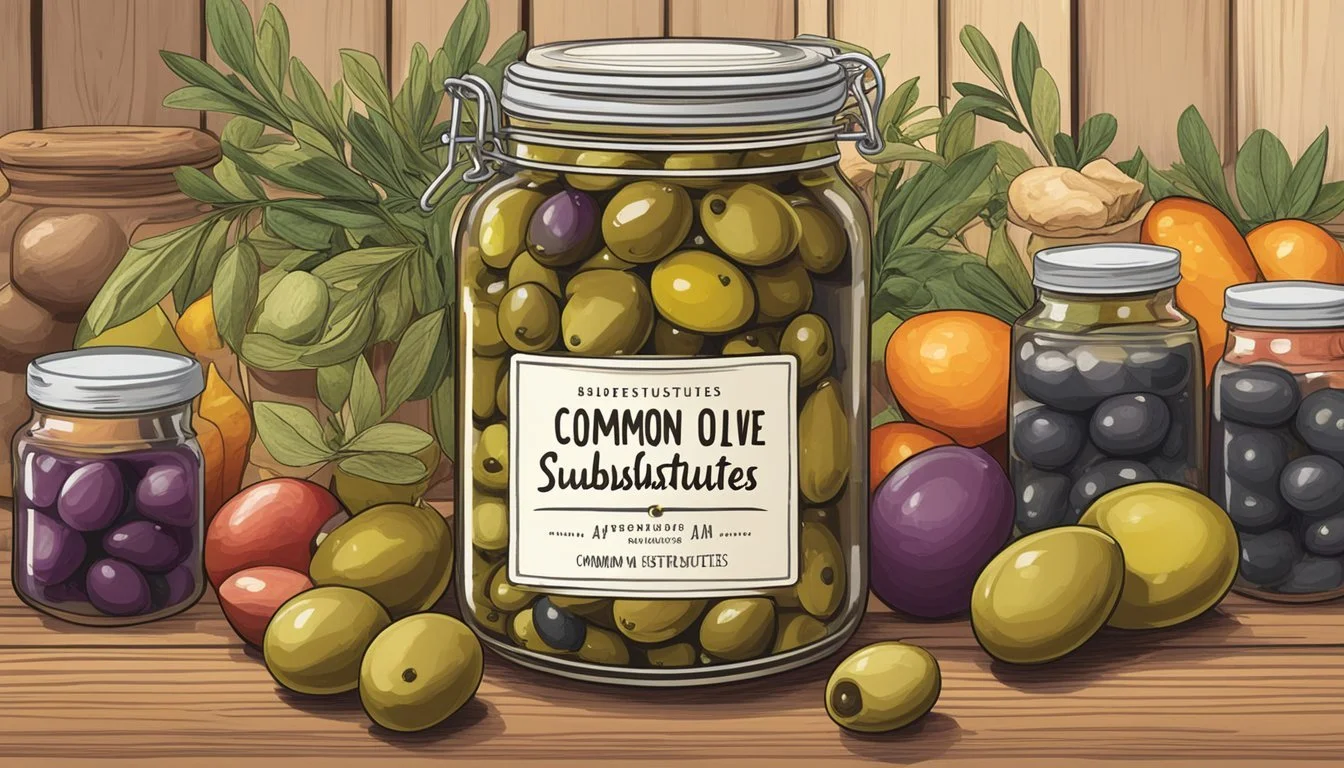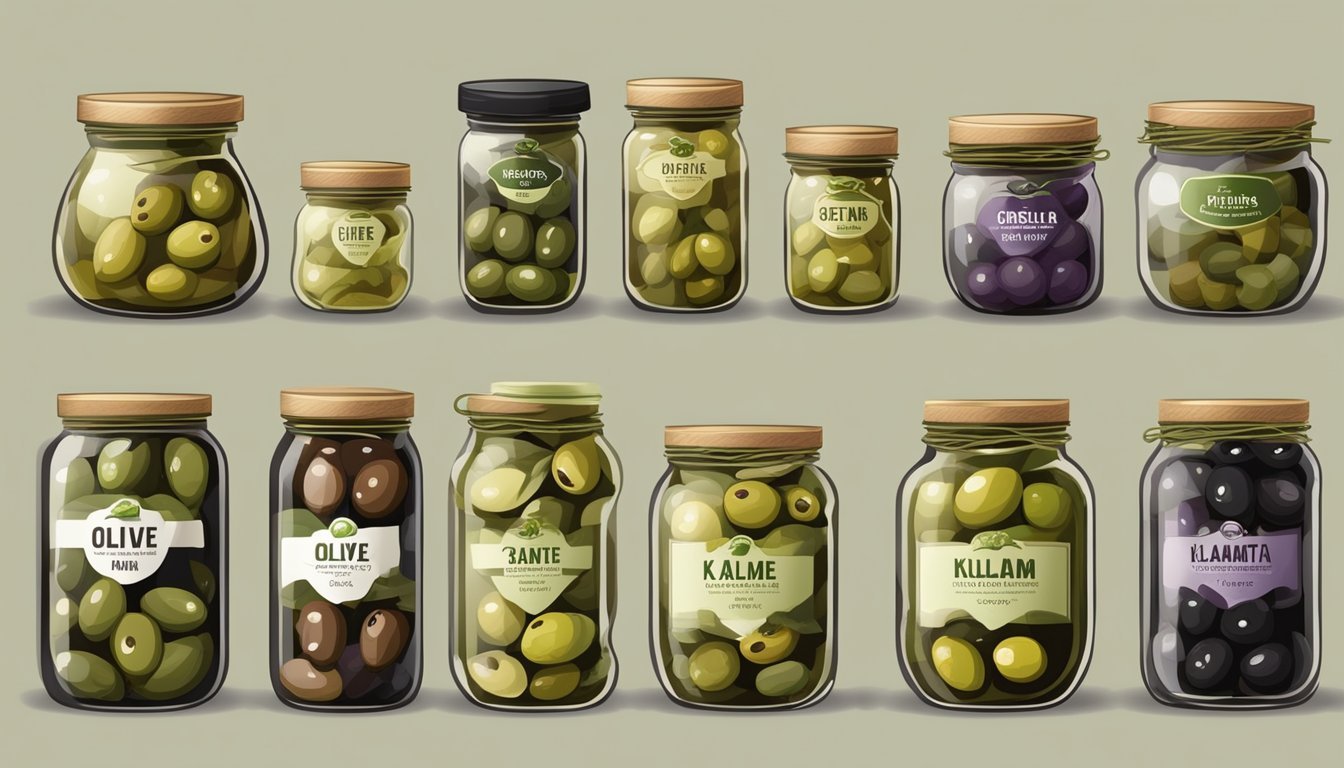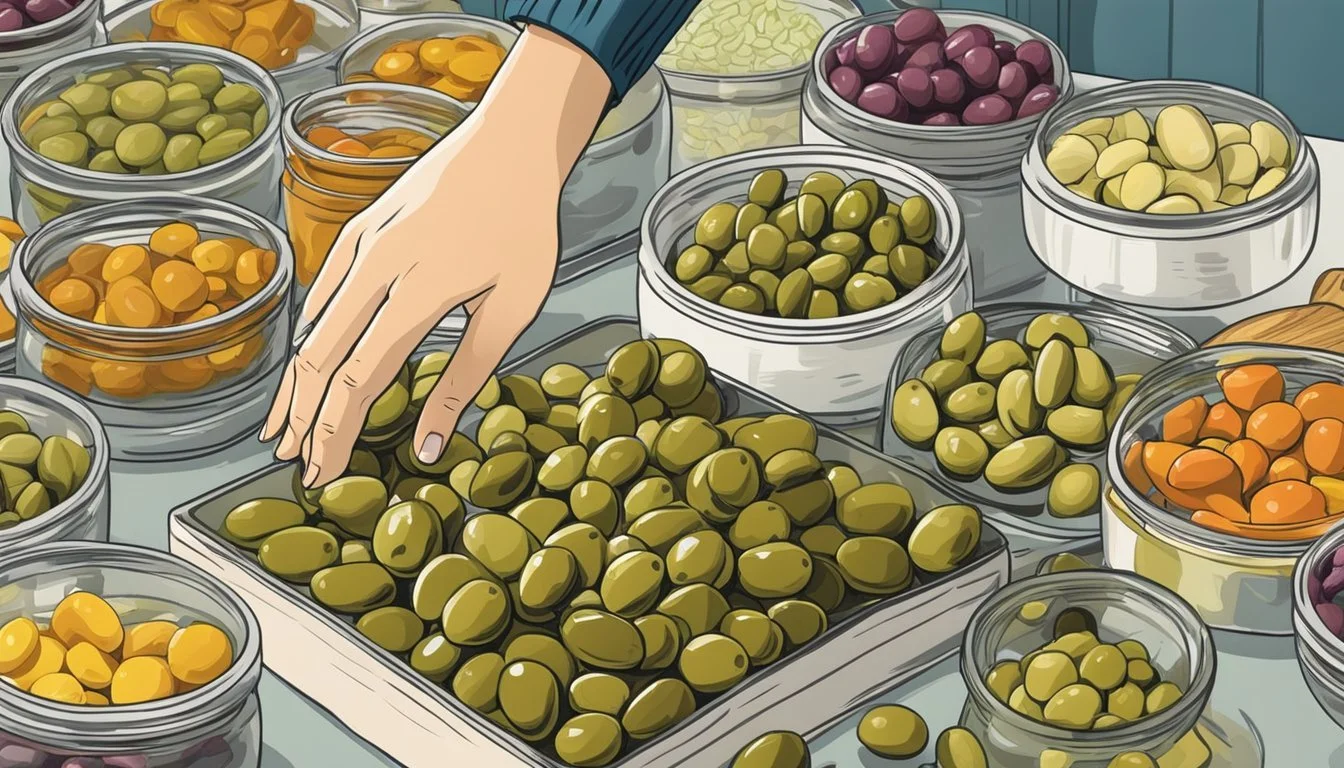Pickled Olives Substitutes
Best Alternatives for Flavor
Looking for an alternative to pickled olives that captures their essence without compromising on flavor and texture? There are numerous substitutes for pickled olives that can match their distinctive taste and nutritional benefits. These alternatives can be especially valuable for those who may not care for the taste of olives but still want to enjoy recipes inspired by Mediterranean cuisine.
Capers stand out as one of the best substitutes, offering a similar briny and slightly sour flavor profile that can enhance many dishes. They are rich in antioxidants and can contribute to a meal’s balance of healthy fats and nutrients, much like olives. For variety, consider exploring pickled tomatoes or pickled onions, both of which bring unique tangy and savory elements to recipes, while maintaining a nutritious profile filled with vitamins and minerals.
Experimenting with substitutes for pickled olives can open up new culinary experiences while ensuring that you still benefit from important nutrients like Vitamin E. Whether you’re creating a salad, topping a pizza, or pairing with cheese, these alternatives can provide that sought-after bite and enhance the overall flavor of your dishes.
The Role of Olives in Cuisine
Olives hold a significant place in culinary traditions worldwide. They not only enhance the flavor of dishes but also offer notable nutritional benefits. Additionally, various types of olives each bring their distinct characteristics to the table.
Culinary Use of Olives
Olives are used extensively in Mediterranean dishes. They add a briny depth to salads, pastas, and pizzas. Green olives are often stuffed with pimentos or cheese, while black olives can be sliced and used as toppings or in tapenades.
In terms of enhancing flavors, Kalamata olives are known for their rich, fruity taste, making them ideal for Greek salads. Castelvetrano olives offer a sweeter flavor, perfect for antipasti platters. Niçoise olives are a staple in the classic French Niçoise salad, bringing a slightly bitter, nutty taste.
Nutritional Profile of Olives
Olives are not only flavorful but also nutritious. They are rich in monounsaturated fats, which are beneficial for heart health. Black olives specifically are a good source of iron. Olives across the board contain vitamin E, which acts as an antioxidant.
Green olives typically have a higher sodium content due to the brining process. However, despite their high salt content, they are low in carbohydrates, making them suitable for low-carb diets. Furthermore, the antioxidant properties in Picholine olives contribute to reducing inflammation.
Varieties of Olives and Their Distinct Flavors
Olives come in numerous varieties, each offering unique tastes and textures. Kalamata olives are dark purple and have a tangy, fruity flavor. Niçoise olives, on the other hand, are small and have a more robust, nutty taste.
Gaeta olives are wrinkled and soft, providing a milder flavor profile. In contrast, Castelvetrano olives are bright green and offer a sweet, buttery taste. Picholine olives from France are elongated and offer a sharp, slightly salty flavor, often used in cocktails.
Each variety brings something unique to different cuisines, enhancing the overall dining experience with their distinct characteristics.
Common Olive Substitutes
There are numerous alternatives to pickled olives, each offering a unique taste and texture. The choice of substitute often depends on the dish being prepared and the type of olives being replaced.
Substitutes Based on Dish Type
Salads and Antipasti:
For dishes like salads and antipasti, capers and pickled peppers work well. Capers offer a briny flavor that can mimic the taste of olives. Pickled peppers add a slight kick, enhancing the complexity of the dish.
Pasta and Pizza:
When replacing olives in pasta and pizza, consider mushrooms and sun-dried tomatoes. Mushrooms provide a similar fleshy texture without the brine, making them a good option for those who dislike the taste of olives. Sun-dried tomatoes add a sweet-tart flavor, enriching the overall taste profile of the dish.
Substitutes for Pickled Olive Varieties
Black Olives:
For black olives, consider using pickled onions or blue cheese. Pickled onions offer a sharp, tangy taste similar to brined olives. Blue cheese, while different in texture, gives a rich, bold flavor that can stand in for black olives in many recipes.
Kalamata Olives:
For Kalamata olives, dried cranberries and Parmesan cheese are excellent substitutes. Dried cranberries provide a sweet-tart flavor that can complement the Mediterranean essence of Kalamata olives. Parmesan cheese adds a salty, umami richness, enhancing the dish in a different yet satisfying way.
Incorporating these substitutes can help maintain the intended flavor and texture of your recipes, ensuring a delightful culinary experience.
Pickled and Brined Substitutes
In the absence of pickled olives, various other pickled and brined foods can make a suitable alternative. These substitutes provide the same tangy and savory flavors essential to many dishes.
Capers and Caper Berries
Capers and caper berries are excellent substitutes for pickled olives. Both have a similar briny taste and can be used in salads, tapenades, and pasta dishes.
Capers are small and have a robust, tangy flavor that can enhance dishes without overwhelming other ingredients. They are often used in Mediterranean cuisine.
Caper berries are larger and milder than capers, making them a good choice when a less intense flavor is desired. They can also be eaten as a snack or appetizer.
Pickled Peppers and Onions
Pickled peppers and onions bring a distinctive tang and crunch that can mimic the taste and texture of pickled olives.
Pickled peppers come in various types such as bell, jalapeño, and cherry peppers. They add not only acidity but also a hint of spice to dishes.
Pickled onions are slightly sweet and very tangy, offering a different but complementary flavor compared to olives. They work well in sandwiches, salads, and charcuterie boards.
Pickles and Gherkins
Pickles and gherkins, especially dill pickles, serve as good alternatives to pickled olives. Their sour and salty taste can substitute for olives in many contexts.
Dill pickles bring a bit of herbal flavor from the dill, enhancing various dishes like burgers, salads, and appetizers.
Gherkins are smaller and often slightly sweeter than regular pickles. They are a popular addition to cheese boards and sandwiches due to their crisp texture and piquant taste.
Artichoke Hearts
Artichoke hearts are a versatile and flavorful substitute for pickled olives. They absorb brine well and have a tender texture.
These hearts have a mild yet distinctive taste, making them suitable for salads, pizzas, and antipasto platters. When marinated, they offer the necessary tanginess and a satisfyingly soft bite, closely emulating the characteristics of pickled olives.
Whether used in a cooked dish or as a raw ingredient, artichoke hearts provide a savory depth that complements various culinary creations.
Salinity and Acidity in Substitutes
Understanding the balance of salinity and acidity is essential when replacing pickled olives. Certain substitutes can effectively mimic these attributes to enhance your dishes.
Balancing Salt and Sour Flavors
When seeking olive substitutes, the foremost consideration is replicating the salty and sour profile. Capers are exceptional for this purpose due to their natural brininess and slight lemony taste. They provide a complex salty and sour flavor that closely parallels olives.
Pickled tomatoes offer a different yet effective approach. Their umami flavor with a hint of savory saltiness adds depth. Unlike capers, they also bring an extra layer of acidity, making them versatile for various recipes.
Lemon Juice and Vinegars
Lemon juice and vinegars are crucial for achieving the necessary acidity in substitutes. Lemon juice adds a bright, tangy note that can elevate the flavor profile of dishes, providing an acidity akin to that found in olives.
Apple cider vinegar and white wine vinegar are particularly effective. These vinegars are not just acidic but also introduce subtle complexities—apple cider with its mellow sweetness and white wine vinegar with its crisp, clean finish. These can be used to marinate vegetables or dress salads, mimicking the briny acidity of olives.
Aromatic Substitutes for Olives
When looking to replace the rich and distinctive flavor of olives, certain herbs, spices, and infused oils can offer equally enticing aromatic profiles. These ingredients can be used to enhance dishes with their unique flavors and aromas.
Herbs and Spices
Herbs and spices can provide a vibrant and aromatic alternative to olives. Capers are an excellent substitute due to their briny, slightly lemony taste. They can be used in salads, pasta dishes, and Mediterranean recipes. Capers also share a visual similarity with green olives, making them a suitable replacement for visual appeal.
Fresh herbs such as rosemary, thyme, and oregano can be used to add a burst of flavor. These herbs are especially effective in Mediterranean and Italian cuisine. For those looking for a spice alternative, consider cumin and coriander seeds, which offer warm and earthy notes.
Infused Oils
Infused oils provide another fantastic way to mimic the aromatic qualities of olives. Olive oil infused with garlic, chili, or herbs like basil and rosemary can impart a rich and savory depth to dishes. These infused oils can be used in dressings, marinades, or simply drizzled over roasted vegetables.
Sun-dried tomatoes in olive oil can impart a tangy, slightly sweet profile, complementing the savory notes usually provided by olives. Additionally, the combination of pickled carrot oil and other pickled vegetables can provide a crunchy texture and a zesty flavor that mirrors the unique taste of olives.
Using these aromatic substitutes ensures that the distinctive flavors olives bring to your meal are not lost, and you maintain the desired culinary effect.
Texture and Consistency Alternatives
For those seeking alternatives to pickled olives, a variety of options are available that closely mimic their texture and consistency.
Cheese Varieties as Substitutes
Blue Cheese offers a creamy, crumbly texture similar to certain types of olives. Its robust flavor can complement dishes that typically call for pickled olives.
Parmesan is another choice, adding a slightly harder texture while maintaining a strong taste. Grated or shaved, it performs well in salads and pasta dishes.
Feta Cheese can be crumbled and used in diverse culinary settings. It provides a soft, moist texture that parallels the juiciness of pickled olives.
Meaty and Vegetable Substitutes
Mushrooms present a fleshy texture, making them ideal for those who avoid olives due to their strong flavor but desire a similar consistency. Sliced or whole, they work splendidly in casseroles and stir-fries.
Sun-Dried Tomatoes introduce a chewy consistency along with a tangy flavor, making them suitable for tapenades and salads.
Anchovies offer a slightly oily and firm texture, catering to recipes where a more intense flavor is desired.
Walnut Oil, while not a direct substitute, can be used to enhance the mouthfeel of dishes in combination with these alternatives, providing richness and depth.
Olives in Diet-Specific Recipes
In diet-specific recipes, finding the right substitutes for olives is crucial for both maintaining flavor and meeting dietary needs. Whether for vegan or health-conscious dishes, there are alternatives that offer similar benefits to olives.
Vegan and Vegetarian Substitutes for Olives
Vegan and vegetarian diets often require plant-based substitutes for olives. Capers serve as an excellent option due to their briny, salty flavor, which mimics that of olives. Pickled onions are another choice, providing a tangy taste that can brighten up any dish.
Caperberries are the mature fruit of the caper bush and can substitute for olives in salads or tapenades. They offer a similar texture and a slightly lemony flavor that complements vegan dishes. Pickled tomatoes, with their umami notes, can replace olives in pasta or antipasti platters.
For those who prefer a milder taste, artichoke hearts offer a more subtle flavor while still providing the desired texture. They are especially useful in Mediterranean recipes where olives typically play a key role.
Health-Conscious Olive Alternatives
For health-conscious diets, finding olive substitutes that still provide health benefits is important. Capers contain antioxidants and have a low calorie count, making them a healthy choice. Avocado slices can substitute for the healthy fats found in olives, as they are rich in oleic acid, which supports heart health.
Pickled cucumbers offer a crunchy texture and can be used in place of olives in sandwiches or salads. They are low in calories and high in water content, which promotes hydration.
Sun-dried tomatoes provide a rich taste and are packed with nutrients such as vitamins A and C. They can replace olives in sauces, pizzas, and salads, adding both flavor and nutritional value without the calories and fat found in olives.
Summary of Key Points
Each of these substitutes offers unique flavors and textures, making them versatile additions to a variety of diet-specific recipes. By considering the flavor profile and nutritional benefits, these alternatives can enhance meals while maintaining dietary preferences.
Application of Substitutes in Popular Dishes
In various culinary applications, substitutes for olives can play a crucial role in maintaining flavor and texture. Find out how these alternatives can enhance your favorite dishes without compromising on taste.
Pasta and Salads
Substitutes like capers and artichoke hearts can be remarkably effective in Greek salads and Puttanesca pasta. Capers provide the briny taste essential for complementing other ingredients. Artichoke hearts add a rich, meaty texture ideal for salads and pasta.
Pickled tomatoes can also replace olives in many recipes. They add a mild, sweet taste that balances well with acidic elements like vinegar or lemon. Use pickled peppers to bring a spicy kick to any pasta dish, ensuring a dynamic flavor profile.
Sandwiches and Pizza
For sandwiches, pickled onions bring a sharp contrast to creamy spreads and meats. They work well in vegetarian sandwiches and pair splendidly with cheeses. Pickled carrots can offer a crunchy, slightly sweet alternative to olives, fitting neatly in both cold and grilled sandwich recipes.
When it comes to pizza, toppings like mushrooms and pickled peppers can substitute for olives. Mushrooms offer an earthy, umami flavor that pairs well with various types of sauce and cheese. Experiment with blue cheese for a bold and distinctive taste, especially on gourmet pizzas.
Tapenade and Dips
Creating a tapenade without olives can be successfully achieved using capers, artichoke hearts, and pickled peppers. Capers give a strong briny taste, while artichoke hearts add a creamy texture. Combine these with fresh herbs and garlic to form a richly flavored paste.
Pickled tomatoes and mushrooms also serve as effective alternatives in dips. They bring unique flavors that can be seasoned to taste, ensuring versatility in various recipes. When blended with nuts or legumes, these substitutes create hearty and delicious spreads.
Cocktails and Beverages
In a classic Martini, pickled onions can replace olives for a different yet satisfying briny touch, particularly in a Gibson. They offer a bite and tang that elevate the overall cocktail experience.
For other beverages, adding elements like pickled carrots or peppers to Bloody Marys can introduce unique flavors. These substitutes not only add visual appeal but also provide distinctive tastes that complement the beverage's profile.
Shopping and Preparing Substitutes
When looking for substitutes for pickled olives, it's essential to know where to find these alternatives in a grocery store and how to prepare them for your recipes. Understanding these two aspects helps ensure your dishes maintain their desired taste and texture.
Selecting Substitutes at the Grocery Store
When shopping for olive substitutes, capers and gherkins are standout options found in most grocery stores. Capers are usually located in the condiment or pickled goods aisle. Look for small jars with brine. Gherkins, with their tangy crunch, can be found in the pickled section.
Other substitutes like pickled tomatoes might be stored in the international foods aisle, often next to other pickled vegetables. Check ingredient labels to ensure no unwanted additives. Blue cheese can be found in the cheese or deli section. Opt for crumbled varieties if available.
Make sure to choose fresh and high-quality products to achieve the best flavors in your cooking.
Preparation Techniques for Olive Alternatives
For capers, rinse under cold water to remove excess brine before adding to your recipes. This helps mellow their strong salty taste. Gherkins can be chopped into small pieces or sliced, depending on the dish's requirements.
Pickled tomatoes might require dicing or slicing. Drain the liquid before use to avoid watering down your recipes. When using blue cheese as a substitute, crumble it finely to distribute its flavor evenly.
Adjust the quantities according to your recipe. Capers and gherkins can be substituted in a 1:1 ratio with olives, but with blue cheese, start with a smaller amount due to its strong flavor and increase as needed.
Use these preparation tips to ensure that your dishes retain their intended flavor and texture with these high-quality substitutes.









